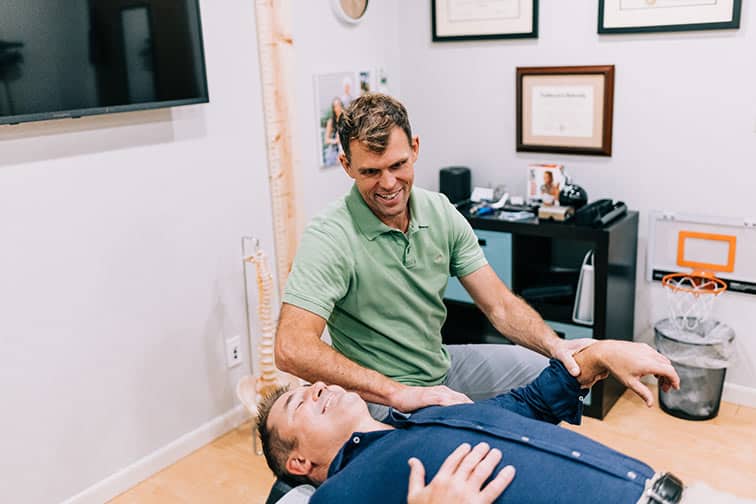Thankfully it has been a few years since I’ve seen the inside of an emergency room. The last time was more than a few years ago in the mountains of northeast Georgia during a bicycle stage race. After getting caught up in a big crash, I was concerned enough about my spine that I took the 2-hour ride in a bumpy ambulance to the closest hospital. As is the case with most intake paperwork, I was asked for my primary care physician (PCP). After a few x-rays, road rash bandaged, and finally able to feel my feet again, the resident asked why in the world I would list a chiropractor as my PCP.
As a chiropractor myself, at the time I found it strange that he was surprised … but then again it was rural Georgia. I didn’t get into explaining the issue with her, as I was more concerned with finding who had my shoes (no one did) and getting myself released with only a broken collarbone.
However, I do think this is an important topic to talk about, especially considering the disparity between the amount of money the US spends on health care vs the actual health of our citizens. We live in a country that spends 17% of its GNP on health care and consistently ranks outside of the top 20 in the world in providing that health care for its citizens.
We’re clearly doing something wrong. Maybe one way to get back on track is focusing on who we choose for our primary care providers (PCPs) and including chiropractors in our choice.
After you finish reading, if you’re unhappy with your PCP — because of long waits in her office, inattentive and hurried encounters, too many prescriptions, always a referral to specialists — you might consider Valeo as another option.
My younger brother is an orthopedic surgeon and one of my dreams has always been to work in a clinical setting with him helping athletes perform their best. Too many times patients feel like they must choose between a natural path or a medical path. Historically, medical associations and their unions have blocked homeopaths, acupuncturists, chiropractors, herbalists, naturopaths, and midwives from patient care as a way to stifle competition. Thankfully, we are moving towards more patient-driven health care. I have summarized some thoughts below with help from one such holistic clinic in Chicago where I grew up.
Why Choose a Chiropractor as Your Primary Care Provider?
Today, selecting a chiropractic physician as your PCP is really not as radical as it sounds. On many insurance websites, answering the question “What types of doctors serve as PCPs?” it’s clearly stated, “depending on your benefit plan, a PCP may also be a nurse practitioner, midwife, or chiropractor.” If insurance companies are willing to pay for this kind of health care, they must have done some research. We all know that insurance companies are picky about what qualifies!
Chiropractors are physicians, and, with the exception of pharmacology and surgery, we receive the same training in science as medical doctors. Chiropractors are trained to recognize signs and symptoms of illness and can order blood tests and x-rays, but if we’ve made a diagnosis or are seeing test results beyond our areas of expertise, we are also taught when to refer to medical doctors. Virtually all PCP chiropractors maintain a referral list of specialists. The relationship between the PCP chiropractor and the specialist is one of mutual respect.
Like MDs, DCs (Doctors of Chiropractic), spend a lot of time learning to perform a good physical exam. That means you can come to your chiropractor for:
- annual check-ups
- sports physicals
- exams required for work
- exams required for driving
- travel exams, like for mission trips
- excuse notes for school or work
- recommendations for ergonomic accommodations
But we also go beyond your regular check-up, adding very sophisticated musculoskeletal and neurological testing. A good musculoskeletal exam is more important than you might think because, as you age, the first systems in your body that start to crash are the bones, joints, tendons, ligaments, and muscles that make up your musculoskeletal system. If you’re basically healthy, odds are that your first encounter with the healthcare system may be for a strained back, pinched nerve, or torn ligament.
In addition to ordering and interpreting routine blood tests, it was PCP chiropractors who introduced functional testing into health care. Commonly used test kits that evaluate your digestive function, measure hormones, or test for food sensitivities all got their start in US chiropractic offices. Chiropractors have paved the way for plenty of testing that has been pivotal for improving people’s health and wellbeing.
Because our training (and license limitations) keep chiropractors away from operating rooms and prescription pads, treatment for virtually any condition — from a bad cold to a bad back, from high cholesterol to high blood pressure, from heartburn/GERD to a bladder infection — begins with lifestyle changes and non-pharmacologic nutritional supplements. The mainstay of chiropractic medicine is prevention: nutrient-dense eating, regular exercise, stress reduction, and nutritional supplements when needed.
It’s unfortunate that when conventional physicians deal with any health issue, they skip benign interventions and reach for the prescription pad, speed dial you a specialist, or schedule you for surgery. Has anyone else felt trapped in a system where more and more is happening to you and by the time you’re discharged, you’re left wondering what happened? PCP chiropractors opt for less invasive means of addressing your symptoms.
So much intense medicalization of everything can be dangerous. Many MDs are too quick to offer overly aggressive treatments. You shouldn’t be shocked to learn that in the US, medical errors are now the third leading cause of death and incorrectly taken prescription drugs are the fourth!
We’d Love to Be Your Kids’ PCP Too!
At Valeo we cherish the opportunity to meet your children and help their brains and bodies develop into the men and women God created them to be. The speed and complexity of nervous system development in children is amazing and continues well into their 20s. The best head start that you can give them is to ensure their brain and nerve system is working properly by having it checked regularly.
We don’t want to take the place of your pediatrician, but if you are interested in raising your kids in a more natural way, include us on their healthcare team. Instead of using Dr. Google (don’t do it) or relying on advice from your pediatrician or a family member, ask us your questions and share your concerns and we would love to give you the natural approach.
God Bless!
Dr. Jon





